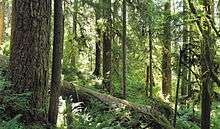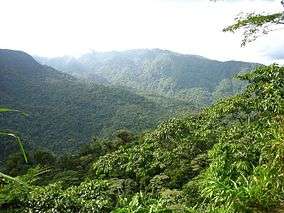List of old-growth forests
This is a list of existing old-growth (including "virgin") forests, or remnants of forest, of at least 10 acres (4.0 hectares). ecoregion information from "Terrestrial Ecoregions of the World".[1]
(NB: The terms "old growth" and "virgin" may have various definitions and meanings throughout the world. See old-growth forest for more information.)
Africa
| Country | Area | Old-growth extent | WWF ecoregion | Old-growth forest type |
|---|---|---|---|---|
| Réunion (France) | Réserve biologique intégrale du Bois des Nèfles | 179 hectares (440 acres) | Tropical and subtropical dry broadleaf forests | |
| Réunion (France) | Réserve biologique intégrale du Piton de la Fournaise | 21,005 hectares (51,900 acres) | Tropical and subtropical moist broadleaf forests | |
| Réunion (France) | Réserve biologique intégrale du Mazerin | 2,491 hectares (6,160 acres) | Tropical and subtropical dry broadleaf forests | Pandanus scrub |
| Kenya | Kakamega Forest |
Australia
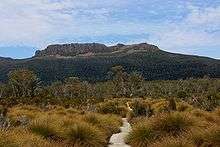
In Australia, the 1992 National Forest Policy Statement (NFPS) made specific provision for the protection of old growth forests. The NFPS initiated a process for undertaking assessments of forests for conservation values, including old growth values. A working group of state and Australian Government agencies took the NFPS definition into consideration in developing a definition that was accepted by all governments (JANIS 1997).[2]
Old growth forest is ecologically mature forest where the effects of disturbances are now negligible.
— JANIS 1997
In 2008, only a relatively small area (15%) of Australia's forests (mostly tall, wet forests) had been assessed for old-growth values.[3]
Of the 23 million hectares (57 million acres) of forest in Australia assessed for their old-growth status, 5 million hectares (12 million acres) (22%) is classified as old-growth.[4] Almost half of Australia's identified old-growth forest is in NSW, mostly on public land.[3] More than 73% of Australia's identified old-growth forests are in formal or informal nature conservation reserves.[4]
In 2001, Western Australia became the first state in Australia to cease logging in old-growth forests.[5]
| Country | Area | Old-growth extent | WWF ecoregion | Old-growth forest type |
|---|---|---|---|---|
| Australia | Walpole Wilderness Area, Western Australia | Jarrah-Karri forest and shrublands | Karri, Jarrah, Eucalyptus jacksonii, Eucalyptus guilfoylei | |
| Australia | Barrington Tops National Park, New South Wales | Eastern Australian temperate forests | subtropical and temperate rainforest and eucalypt | |
| Australia | Greater Blue Mountains Area, New South Wales | Eastern Australian temperate forests | eucalypt forest | |
| Australia | Tarkine, Tasmania | 2,000 square kilometres (770 sq mi) | Tasmanian temperate rain forests | Temperate rainforest |
| Australia | Tasmanian Wilderness | Tasmanian temperate rain forests | temperate rainforest and eucalypt forest | |
| Australia | Goolengook, East Gippsland, Victoria | Over 20 square kilometres (7.7 sq mi) | Eastern Australian temperate forests | rare warm temperate/cool temperate "Overlap Rainforest" |
| Australia | Blue Tier, Tasmania | 100 hectares (250 acres)[6] | Tasmanian temperate rain forests | myrtle canopy, unusually diverse understorey for temperate rainforest (celery top pine, waratah, sassafras, tree fern), threatened Simson's Stag Beetle. |
| Australia | Styx Forest, Tasmania | Tasmanian temperate rain forests | ||
| Australia | Weld, Tasmania | Tasmanian temperate rain forests | ||
| Australia | Upper Florentine Valley, Tasmania | Tasmanian temperate rain forests | ||
| Australia | Badja State Forest, New South Wales[7] | Eastern Australian temperate forests | Wet old-growth with sweeping tree-fern understoreys. 10+ threatened species (including squirrel glider and golden-tipped bat) | |
| Australia | Dampier State Forest, New South Wales[7] | Eastern Australian temperate forests | Wet old-growth. Most extensive rainforests in the South Coast. | |
| Australia | Wandella / Peak Alone, New South Wales[7] | Eastern Australian temperate forests | High old-growth and threatened species values. Important catchment value. | |
| Australia | Monga State Forest / Buckenbowra, New South Wales[7] | Eastern Australian temperate forests | Pristine Buckenbowra River, including an area on the northern side of the river with a golden-tipped bat record. Also an area around McGregors Creek, nominated for wilderness, and important for old-growth and to increase the viability of the connection / link between Buckenbowra and Deua National Park. | |
| Australia | Dampier, New South Wales[7] | Eastern Australian temperate forests | Upper Deua River (Identified Wilderness) and Big Belimba Creek catchment and contains extensive old-growth forests. Big Belimba Creek contains giant wet old-growth forest and extensive tree-fern forests. | |
| Australia | Tallaganda State Forest, New South Wales[7] | Eastern Australian temperate forests | Tall wet old-growth forest. | |
| Australia | Gondwana Rainforests of Australia | 50 separate reserves totaling 366,500 hectares (906,000 acres) | Subtropical rainforest | The most extensive area of subtropical rainforest in the world. Extremely high conservation value; over 200 rare or threatened plant and animal species. |
The term "old-growth forests" is rarely used in New Zealand, instead, "The Bush" is used to refer to native forests. There are large contiguous areas of forest cover that are protected areas.
Eurasia
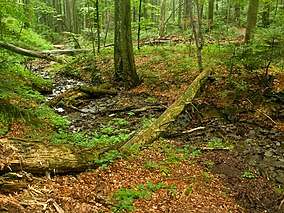
| Country | Area | Old-growth extent | WWF ecoregion | Old-growth forest type | |
|---|---|---|---|---|---|
| Azerbaijan | Lankaran lowland and Talysh mountains | Caspian Hyrcanian mixed forest | temperate broadleaf and mixed forests biome | ||
| Belarus, Poland | Białowieża Forest | 308,580 hectares (762,500 acres) | Central European mixed forests | ||
| Bosnia and Herzegovina | Perućica | 1,434 hectares (3,540 acres) | Dinaric Mountains mixed forests | ||
| Bulgaria[8] | Ancient and Primeval Beech Forests of Europe in the Central Balkan National Park | 1,098,891 hectares (2,715,420 acres) | Rodope montane mixed forests | Temperate broadleaf and mixed forests biome | |
| Bulgaria[8] | Bayuvi Dupki–Dzhindzhiritsa (temperate coniferous forest), Pirin National Park | 2,873 hectares (7,100 acres) | Rodope montane mixed forests | Temperate broadleaf and mixed forests biome | |
| Bulgaria[8] | Mantaritza Biosphere Reserve forests | 1,320 hectares (3,300 acres) | Rodope montane mixed forests | Temperate broadleaf and mixed forests biome | |
| Bulgaria[8] | Parangalitsa Reserve forests, Rila National Park | 1,509 hectares (3,730 acres) | Rodope montane mixed forests | Temperate broadleaf and mixed forests biome | |
| Bulgaria[8] | Uzunbodzhak Reserve temperate rainforest, Strandzha Nature Park, Strandzha Mountain | 2,529.6 hectares (6,251 acres) | Euxine-Colchic deciduous forests | Temperate broadleaf and mixed forests biome (Euxine-Colchic deciduous forests) | |
| Czech Republic | Boubin Primeval Forest | 685.9 hectares (1,695 acres) | |||
| Finland | Pyhä-Häkki National Park | Scandinavian and Russian taiga | Scots pine and Norway spruce | ||
| France | Réserve Biologique Intégrale d'Assan | 1,032 hectares (2,550 acres) | Temperate coniferous forest | Pinus sylvestris, Abies alba, Larix decidua, Juniperus thurifera and Pinus uncinata | |
| France | Réserve Biologique Intégrale de Chaux | 148 hectares (370 acres) | Temperate broadleaf and mixed forest | Abies alba, Picea abies and Fagus sylvatica | |
| France | Réserve Biologique Intégrale de la Glacière | 28 hectares (69 acres) | Temperate broadleaf and mixed forest | Abies alba, Picea abies and Fagus sylvatica | |
| France | Réserve Biologique Intégrale de la Sainte-Baume | 138 hectares (340 acres) | Temperate broadleaf and mixed forest | Fagus sylvatica, Quercus pubescens, Taxus baccata, Ilex aquifolium, Tilia cordata, maple and Quercus ilex | |
| France | Réserve Biologique Intégrale de la Sylve d’Argenson | 2,579 hectares (6,370 acres) | Temperate broadleaf and mixed forest | Fagus sylvatica, Quercus petraea and Quercus robur | |
| France | Réserve Biologique Intégrale de Saint-Pé-de-Bigorre | 1,010 hectares (2,500 acres) | Temperate broadleaf and mixed forest | Fagus sylvatica, Tilia cordata and Maple | |
| France | Réserve Biologique Intégrale des Maures | 2,531 hectares (6,250 acres) | Mediterranean forests, woodlands, and scrub | Quercus ilex, Quercus suber, Castanea sativa and Pinus pinaster | |
| France | Réserve Biologique Intégrale du Mont Ventoux | 906 hectares (2,240 acres) | Temperate broadleaf and mixed forest | Pinus uncinata, Pinus nigra, Pinus sylvestris, Fagus sylvatica and Abies alba | |
| France | Réserve Biologique Intégrale du Défilé de Straiture | 124 hectares (310 acres) | Temperate broadleaf and mixed forest | Abies alba, Picea abies and Fagus sylvatica | |
| France | Réserve Biologique Intégrale d'Oléron - Saint-Trojan | 158 hectares (390 acres) | Temperate broadleaf and mixed forest | Quercus ilex, Quercus petraea and Pinus pinaster | |
| France | Réserve Biologique Intégrale du Bois du Ruère | 64 hectares (160 acres) | Temperate broadleaf and mixed forest | Fagus sylvatica, Quercus robur, Carpinus betulus, Tilia cordata and Maple | |
| France | Réserve Biologique Intégrale du Vercors | 2,160 hectares (5,300 acres) | Temperate broadleaf and mixed forest | Abies alba, Picea abies and Fagus sylvatica | |
| Croatia | Klepina Duliba Old Growth forest | 118 hectares (290 acres) | Temperate broadleaf and mixed forest | Abies alba,Picea abies and Fagus sylvatica | |
| Georgia | Kintrishi Protected Landscape | Euxine-Colchic deciduous forests | temperate broadleaf rainforest | ||
| Georgia | Lagodekhi Protected Areas | Caucasus mixed forests | temperate broadleaf forest | ||
| Georgia | Mtirala National Park | Euxine-Colchic deciduous forests | temperate broadleaf rainforest | ||
| India | Dudhatoli Mountains, Uttarakhand | 6,000 hectares (15,000 acres) | Western Himalayan broadleaf forests and subalpine conifer forests | temperate broadleaf mixed forests and montane forests biome | |
| Iran | Coast along the Caspian Sea and the northern slopes of the Alborz mountains | Caspian Hyrcanian mixed forest[9] | temperate broadleaf and mixed forests biome | ||
| Italy | Valle Cervara | 50 hectares (120 acres) | Oldest beech forest in Europe [10] | temperate broadleaf and mixed forests biome. Fagus sylvatica Taxus. /lex, plusieurs Betulaceae (Carpinus spp., Ostrya. Corylus, Alnus cordata dans certains endroits, Betula), Ulmus spp. (surtout U glabra), Fraxinus ornus (plus rarement F excelsior) et Acer (A. opalus s.l., A. pseudoplatanus, A. platanoides, A. /obelii) | |
| Japan | Shiretoko National Park | Hokkaido deciduous forests, Hokkaido montane conifer forests | temperate and subalpine mixed forest | ||
| Japan | Yakushima Wilderness Area | Nansei Islands subtropical evergreen forests, Taiheiyo evergreen forests | subtropical and temperate rainforest | ||
| Japan | Kasugayama Primeval Forest | Taiheiyo evergreen forests | |||
| Montenegro | Biogradska Gora | Dinaric Mountains mixed forests | temperate broadleaf and mixed forest | ||
| Norway | Trillemarka | Scandinavian and Russian taiga | |||
| Norway | Stabbursdalen National Park | Scandinavian and Russian taiga | |||
| Norway | Øvre Dividal National Park | Scandinavian and Russian taiga, Scandinavian montane birch forest and grasslands | |||
| Romania | Retezat National Park | Carpathian montane conifer forests | |||
| Russia | Central Sikhote-Alin | Ussuri broadleaf and mixed forests | |||
| Russia | Virgin Komi Forests | Urals montane tundra and taiga | Coniferous | ||
| Russia | Western Caucasus | Caucasus mixed forests | |||
| Serbia | Vinatovača | 37 hectares (91 acres) | Temperate broadleaf and mixed forest | Fagus sylvatica | |
| Slovakia | Stužica | 761.5 hectares (1,882 acres) | Pannonian mixed forests | European Beech | |
| Slovenia | 14 virgin forests and many forest reserves - 10,000 ha in total | ||||
| Ukraine | Carpathian Biosphere Reserve | 57,880 hectares (143,000 acres) | Ancient and Primeval Beech Forests of the Carpathians and Other Regions of Europe | ||
| United Kingdom | Forest of Dean | mixed woodland | |||
| United Kingdom | Puzzlewood |
North America
Canada
| Province | Area | Old-growth extent | WWF ecoregion | Old-growth forest type |
|---|---|---|---|---|
| British Columbia | Carmanah Walbran Provincial Park | 164 square kilometres (41,000 acres) | Central Pacific coastal forests | coniferous temperate rainforest |
| British Columbia | Clayoquot Sound | 265,000 hectares (650,000 acres) | Central Pacific coastal forests | coniferous temperate rainforest |
| British Columbia | Great Bear Rainforest | 16,000 square kilometres (4,000,000 acres) | British Columbia mainland coastal forests | coniferous temperate rainforest |
| Nova Scotia | North River Wilderness Area[11] | New England-Acadian forests | Eastern Hemlock | |
| Nova Scotia | Panuke Lake Nature Reserve[11] | 47 hectares (120 acres) | New England-Acadian forests | Eastern Hemlock, Red Spruce |
| Nova Scotia | Shelburne Heritage River[11] | New England-Acadian forests | Eastern Hemlock, pine | |
| Nova Scotia | Pollett's Cove[11] | Eastern Canadian forests, New England-Acadian forests | boreal | |
| Nova Scotia | French River Wilderness Area[11] | New England-Acadian forests | Eastern Hemlock | |
| Nova Scotia | Trout Brook Wilderness Area[11] | deciduous | ||
| Nova Scotia | Tobeatic Wilderness Area[11] | New England-Acadian forests | Eastern Hemlock, pine | |
| Nova Scotia | Portapique River Wilderness Area[11] | New England-Acadian forests | Eastern Hemlock, Red Spruce | |
| Nova Scotia | Waverley–Salmon River Long Lake Wilderness Area[11] | New England-Acadian forests | Eastern Hemlock, Red Pine, Eastern White Pine | |
| Nova Scotia | Boggy Lake Wilderness Area[11] | New England-Acadian forests | Sugar Maple, Yellow Birch, American Beech | |
| Nova Scotia | Great Barren & Quinan Lakes Nature Reserve[11] | New England-Acadian forests | Eastern Hemlock, Red Spruce | |
| Nova Scotia | MacFarlane Woods Nature Reserve[11] | New England-Acadian forests | Sugar Maple, Yellow Birch, American Beech | |
| Nova Scotia | Bornish Hill Nature Reserve[11] | New England-Acadian forests | hardwood | |
| Nova Scotia | Sporting Lake Nature Reserve[11] | 25 hectares (62 acres) | New England-Acadian forests | Eastern Hemlock, White Pine, Red Spruce |
| Ontario | Obabika Old-Growth Forest | 2,400 hectares (5,900 acres) | ||
| Ontario | Quetico Provincial Park | 1,500 square kilometres (370,000 acres) | Western Great Lakes forests | |
| Ontario | White Bear Forest | Eastern forest-boreal transition | ||
| Quebec | Bois Beckett Forest,[12] Sherbrooke | 6 ha (15 acres) | hemlock, beech | |
| Quebec | Papineau Woods, Laval |
United States
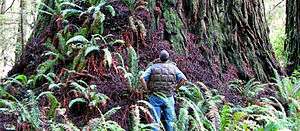
| State | Area | Old-growth extent | WWF ecoregion | Old-growth forest type |
|---|---|---|---|---|
| Alabama | Sipsey Wilderness[13] | Appalachian mixed mesophytic forests | Eastern Hemlock, American Beech, Sweet Birch, White Oak, Tulip Poplar[13] | |
| Alaska | Tongass National Forest[14] | 5,400,000 acres (2,200,000 ha) | Northern Pacific coastal forests, Pacific Coastal Mountain icefields and tundra | Western Red Cedar, Sitka Spruce, Western Hemlock |
| Arkansas | White River National Wildlife Refuge[13] | 973 acres (394 ha)[13] | Mississippi lowland forests | American Sweetgum, Nuttall's Oak, Willow Oak, Sugarberry, American Elm, Green Ash, American Sycamore, Pecan, American Elm, Baldcypress[13] |
| Arkansas | Ouachita National Forest[13] | 800,000 acres (320,000 ha)[13] | Post Oak, Shortleaf Pine, Hickory, Northern Red Oak, White Oak, Blackjack Oak, Eastern Redcedar, Gum Bumelia, Winged Elm, Yaupon[13] | |
| Arkansas | Ozark-St. Francis National Forest[15] | 11,000 acres (4,500 ha)[15] | Shortleaf Pine, Post Oak, Blackjack Oak, Eastern Black Oak, White Oak, Northern Red Oak[15] | |
| Arkansas | Hot Springs National Park[13] | 320 acres (130 ha)[13] | Shortleaf Pine, Blackjack Oak, White Oak[13] | |
| Arkansas | Overflow National Wildlife Refuge[13] | 230 acres (93 ha)[13] | American Beech, Sugar Maple[13] | |
| California | Yosemite National Park[16] | 225,510 acres (91,260 ha)[16] | Sierra Nevada forests | Giant Sequoia, Ponderosa Pine, Jeffrey Pine, Sugar Pine, White Fir, California Incense Cedar, Coast Douglas-fir, Red Fir, Western White Pine, Lodgepole Pine, Foxtail Pine |
| California | Sequoia-Kings Canyon National Park[16] | 202,430 acres (81,920 ha)[16] | Sierra Nevada forests | Giant Sequoia, Ponderosa Pine, Jeffrey Pine, Sugar Pine, White Fir, Red Fir, California Incense Cedar |
| California | Lassen Volcanic National Park[16] | 27,130 acres (10,980 ha) | Sierra Nevada forests | Ponderosa Pine, Jeffrey Pine, Sugar Pine, White Fir, Red Fir, Western White Pine, Mountain Hemlock, Lodgepole Pine, Whitebark Pine |
| California | Redwood National and State Parks[17] | 38,982 acres (15,775 ha) or more[17] | Northern California coastal forests | Coast Redwood |
| California | Humboldt Redwoods State Park[16] | 23,600 acres (9,600 ha)[16] | Northern California coastal forests | Coast Redwood |
| California | Muir Woods National Monument[16] | 240 acres (97 ha)[16] | California interior chaparral and woodlands | Coast Redwood |
| California | Samuel P. Taylor State Park[16] | 600 acres (240 ha) | California interior chaparral and woodlands | Coast Redwood |
| California | Big Basin Redwoods State Park[16] | 10,800 acres (4,400 ha)[16] | Northern California coastal forests | Coast Redwood |
| California | Henry Cowell Redwoods State Park[16] | 200 acres (81 ha)[16] | Northern California coastal forests | Coast Redwood, Coast Douglas-fir, Pacific Madrone, Ponderosa Pine |
| California | Headwaters Forest Reserve[18] | 3,088 acres (1,250 ha)[18] | Northern California coastal forests | Coast Redwood |
| California | Blue oak woodlands[19] | 500,000–2,300,000 acres (200,000–930,000 ha)[19] | California interior chaparral and woodlands | Blue Oak |
| California | Angeles National Forest[20] | 29,000 acres (12,000 ha)[20] | California montane chaparral and woodlands | Jeffrey Pine, Coast Douglas-fir, Ponderosa Pine, White Fir, Lodgepole Pine[20] |
| California | Eldorado National Forest[20] | 122,000 acres (49,000 ha)[20] | Sierra Nevada forests | Coast Douglas-fir, Ponderosa Pine, White Fir, Lodgepole Pine, Red Fir[20] |
| California | Inyo National Forest[20] | 238,000 acres (96,000 ha)[20] | Sierra Nevada forests – Great Basin montane forests | Lodgepole Pine, Jeffrey Pine, Great Basin Bristlecone Pine[20] |
| California | Klamath National Forest[20] | 168,000 acres (68,000 ha)[20] | Klamath-Siskiyou forests | Ponderosa Pine, Jeffrey Pine, Coast Douglas-fir, Red Fir, White Fir, California Incense Cedar[20] |
| California | Lassen National Forest[20] | 92,000 acres (37,000 ha)[20] | Coast Douglas-fir, Ponderosa Pine, White Fir, Jeffrey Pine, Red Fir, Lodgepole Pine[20] | |
| California | Los Padres National Forest[20] | 18,900 acres (7,600 ha)[20] | Jeffrey Pine, Coast Redwood, Coast Douglas-fir, White Fir[20] | |
| California | Mendocino National Forest[20] | 60,000 acres (24,000 ha)[20] | Coast Douglas-fir, Ponderosa Pine, White Fir, Tanoak, Pacific madrone[20] | |
| California | Modoc National Forest[20] | 43,400 acres (17,600 ha)[20] | Lodgepole Pine, Ponderosa Pine, White Fir, California Incense Cedar, Red Fir[20] | |
| California | Plumas National Forest[20] | 127,000 acres (51,000 ha)[20] | Coast Douglas-fir, Ponderosa Pine, White Fir, Jeffrey Pine, Red Fir[20] | |
| California | San Bernardino National Forest[20] | 87,400 acres (35,400 ha)[20] | Coast Douglas-fir, Ponderosa Pine, White Fir, Jeffrey Pine, Lodgepole Pine[20] | |
| California | Sequoia National Forest[20] | 196,000 acres (79,000 ha)[20] | Giant Sequoia, Jeffrey Pine, Red Fir, Coast Douglas-fir, Ponderosa Pine, White Fir, Lodgepole Pine[20] | |
| California | Shasta-Trinity National Forest[20] | 230,000 acres (93,000 ha)[20] | Coast Douglas-fir, Tanoak, Pacific madrone, Red Fir, White Fir, Jeffrey Pine[20] | |
| California | Sierra National Forest[20] | 383,000 acres (155,000 ha)[20] | Lodgepole Pine, Red Fir[20] | |
| California | Six Rivers National Forest[20] | 137,000 acres (55,000 ha)[20] | Coast Douglas-fir, Tanoak, Pacific madrone, White Fir[20] | |
| California | Stanislaus National Forest[20] | 139,000 acres (56,000 ha)[20] | Lodgepole Pine, Jeffrey Pine, White Fir[20] | |
| California | Tahoe National Forest[20] | 84,000 acres (34,000 ha)[20] | Coast Douglas-fir, Ponderosa Pine, White Fir, Sugar Pine, California Incense Cedar, California Black Oak, Lodgepole Pine, Red Fir[20] | |
| Colorado | Arapaho National Forest[21] | 2,590 hectares (6,400 acres)[21] | Subalpine Fir, Engelmann Spruce[21] | |
| Connecticut | Cathedral Pines[13] | 42 acres (17 ha)[13] | White Pine, Hemlock[13] | |
| Connecticut | Sage's Ravine[13] | 100 acres (40 ha)[13] | Hemlock, Oak[13] | |
| Connecticut | Great Mountain Forest -- North Forty[13] | 40 acres (16 ha)[13] | Hemlock, Hardwoods, White Pine[13] | |
| Connecticut | Great Mountain Forest -- Bigelow Pond[13] | 5 acres (2.0 ha)[13] | Hemlock[13] | |
| Connecticut | Mount Riga Incorporated[13] | 8 acres (3.2 ha)[13] | White Pine, Eastern Hemlock, Yellow Birch, American Beech[13] | |
| Connecticut | Bear Mountain[13] | 5 acres (2.0 ha)[13] | Sweet Birch, Pitch Pine[13] | |
| Florida | Eglin Air Force Base[13] | 6,795 acres (2,750 ha)[13] | longleaf pine[13] | |
| Florida | Apalachicola National Forest[13] | Southeastern conifer forests | Pondcypress, Slash Pine[13] | |
| Florida | Big Cypress National Preserve[13] | 23,000 acres (9,300 ha)[13] | South Florida rocklands, Everglades | slash pine[13] |
| Florida | Big Cypress National Preserve[13] | 158,000 acres (64,000 ha)[13] | South Florida rocklands, Everglades | pondcypress[13] |
| Florida | Tosohatchee Wildlife Management Area[13] | 1,000 acres (400 ha) | Floodplain swamp | |
| Florida | Tosohatchee Wildlife Management Area[13] | 40 acres (16 ha) | Mesic flatwoods | |
| Florida | Tosohatchee Wildlife Management Area[13] | Unknown, up to 1000 acres | Hydric hammock | |
| Georgia | Chattahoochee National Forest[22] | 346 acres (140 ha)[22] | Appalachian-Blue Ridge forests | River floodplain hardwood, Dry-mesic oak forest, Seasonally wet oak-hardwood woodland[22] |
| Georgia | Fernbank Forest | 65 acres (26 ha) | Piedmont Hardwood Forest | Tulip Poplar – Oak – Hickory |
| Illinois | Shawnee National Forest[13] | 2,800 acres (1,100 ha)[13] | post oak – blackjack oak[13] | |
| Illinois | Cache River State Natural Area[13] | 1,600 acres (650 ha)[13] | Central U.S. hardwood forests | |
| Illinois | Cypress Creek National Wildlife Refuge[13] | 500 acres (200 ha)[13] | Central U.S. hardwood forests | |
| Illinois | Beall Woods State Park[13] | 329 acres (133 ha)[13] | Central U.S. hardwood forests | |
| Indiana | Hoosier National Forest[13] | 390 acres (160 ha)[13] | Central U.S. hardwood forests | Post Oak[13] |
| Indiana | Douglas Woods[23] | 400 acres (160 ha)[23] | Southern Great Lakes forests | Silver Maple, Oak, Hickory[23] |
| Indiana | Pioneer Mothers Memorial Forest[24] | 88 acres (36 ha)[24] | Central U.S. hardwood forests | Oak |
| Indiana | Ginn Woods[25] | 161 acres (65 ha)[25] | Southern Great Lakes forests | |
| Indiana | Meltzer Woods[26] | 48 acres (19 ha)[25] | Southern Great Lakes forests | Bur oak, Black ash, Swamp white oak, Beech, Maples |
| Indiana | Bicentennial Woods[27] | 79 acres (32 ha)[27] | Southern Great Lakes forests | Oaks, Maples, Sycamores, Sassafras, Slippery elm and Flowering dogwood |
| Kansas | Fort Leavenworth[13] | 1,000 acres (400 ha)[13] | Central forest-grasslands transition | Eastern floodplain[13] |
| Kentucky | Blanton Forest[13] | 2,239 acres (906 ha)[13] | ||
| Kentucky | Lilley Cornett Woods[13] | 252 acres (102 ha)[13] | ||
| Maine | Baxter State Park[13] | 23,094 acres (9,346 ha)[13] | Balsam Fir[13] | |
| Maine | Mahoosuc Mountains Ecological Reserve[13] | 2,444 acres (989 ha)[13] | Balsam Fir[13] | |
| Maine | Bigelow Mountain Ecological Reserve[13] | 3,100 acres (1,300 ha)[13] | Balsam Fir[13] | |
| Maine | Big Reed Forest Preserve[13] | 5,000 acres (2,000 ha) or less | northern hardwoods, spruce-fir, rich woods, and cedar swamps | |
| Maryland | Belt Woods[13] | 43 acres (17 ha)[13] | white oak – tulip poplar[13] | |
| Maryland | Swallow Falls State Park ("Hemlock Grove")[28] | 39 acres (16 ha)[28] | Appalachian mixed mesophytic forests | eastern hemlock – white pine[28] |
| Maryland | Potomac-Garrett State Forest ("Crabtree Woods")[29] | 500 acres (200 ha)[29] | Appalachian mixed mesophytic forests | sugar maple – red oak – basswood – cucumber tree[29] |
| Massachusetts | Mohawk Trail State Forest[13] | 612 acres (248 ha)[13] | New England-Acadian forests | northern hardwood[13] |
| Massachusetts | Ice Glen | New England-Acadian forests | northern hardwood[30] | |
| Massachusetts | Monroe State Forest[13] | 273 acres (110 ha)[13] | New England-Acadian forests | northern hardwood[13] |
| Massachusetts | Mount Everett State Reservation[13] | 530 acres (210 ha)[13] | New England-Acadian forests | northern hardwood[13] |
| Massachusetts | Mount Greylock[13] | 555 acres (225 ha)[13] | New England-Acadian forests | northern hardwood[13] |
| Massachusetts | Mount Wachusett[13] | 220 acres (89 ha)[13] | New England-Acadian forests | northern hardwood[13] |
| Massachusetts | Mount Washington State Forest[13] | 300 acres (120 ha)[13] | New England-Acadian forests | northern hardwood[13] |
| Massachusetts | William Cullen Bryant Homestead[31][32] | 109 acres (44 ha) | New England-Acadian forests | Eastern White Pine, Black Cherry, Sugar Maple |
| Michigan | Hartwick Pines State Park[13] | 49 acres (20 ha)[33] | Western Great Lakes forests | Eastern White Pine, Red Pine, Eastern Hemlock, Beech, Sugar Maple[13] |
| Michigan | Porcupine Mountains[13] | 31,000 acres (13,000 ha)[13] | Western Great Lakes forests | northern hardwood[13] |
| Michigan | Sylvania Wilderness[13] | 15,000 acres (6,100 ha)[13] | Western Great Lakes forests | northern hardwood[13] |
| Minnesota | Boundary Waters[13] | 401,000 acres (162,000 ha)[13] | Western Great Lakes forests | white pine, red pine, fir/birch, jack pine – black spruce, maple, aspen [13] |
| Minnesota | Keeley Creek Natural Area[13] | 900 acres (360 ha)[13] | Western Great Lakes forests | bog and upland[13] |
| Minnesota | Itasca State Park[13] | 4,094 acres (1,657 ha)[13] | Western Great Lakes forests | Eastern White Pine, Red Pine[13] |
| Missouri | Mark Twain National Forest[13] | 30,000 acres (12,000 ha) or less[13] | Central U.S. hardwood forests | Post Oak and Chinkapin Oak savanna and flatwoods[13] |
| Missouri | Caney Mountain[13] | 4,000 acres (1,600 ha) or more[13] | Central U.S. hardwood forests | post oak savanna[13] |
| New Hampshire | Great Gulf[13] | New England-Acadian forests | ||
| New Hampshire | Crawford Notch[13] | New England-Acadian forests | ||
| New Hampshire | The Bowl Research Natural Area[34] | 510 acres (210 ha) | New England-Acadian forests | Red Spruce, Balsam fir, Beech, Yellow birch, Sugar maple, Paper birch |
| New Hampshire | Hemenway State Forest[35] | 135 acres (55 ha)[35] | New England-Acadian forests | Eastern White Pine[35] |
| New Hampshire | The Bowl Research Natural Area[34] | 510 acres (210 ha) | New England-Acadian forests | Red Spruce, Balsam fir, Beech, Yellow birch, Sugar maple, Paper birch |
| New Jersey | Saddler's Woods[13] | 25 acres (10 ha)[13] | Northeastern coastal forests | Eastern Black Oak, White Oak, Northern Red Oak, American Beech, Tulip Poplar, Red Maple[13] |
| New Jersey | Bear Swamp[13] | 215 acres (87 ha)[13] | Atlantic coastal pine barrens | Black Gum, American Sweetgum, Red Maple, Sweetbay Magnolia, American Beech, Swamp White Oak, American Holly[13] |
| New Jersey | William L. Hutcheson Memorial Forest[13] | 65 acres (26 ha)[13] | Northeastern coastal forests | White Oak, Eastern Black Oak, Northern Red Oak[13] |
| New Jersey | Tillman Ravine[13] | 25 acres (10 ha)[13] | Allegheny Highlands forests | Eastern Hemlock[13] |
| New York | Catskill Mountains[13] | 60,000 acres (24,000 ha) or more[13] | Allegheny Highlands forests | |
| New York | Adirondack Mountains[13] | 150,000 acres (61,000 ha) or more[13] | Eastern forest-boreal transition | |
| New York | The New York Botanical Garden[13] | 50 acres (20 ha) or more[13] | Northern hardwood forest | |
| New York | Mianus River Gorge Preserve[36][37] | 60 - 100 acres (24 - 40.5 ha)[38][36] | Appalachian hemlock–northern hardwood forest | Eastern hemlock-beech forest |
| North Carolina | Great Smoky Mountains[13] | 187,000 acres (76,000 ha)[13] | Appalachian-Blue Ridge forests | |
| North Carolina | Nantahala National Forest[13] | 30,800 acres (12,500 ha)[13] | Appalachian-Blue Ridge forests | |
| North Carolina | Pisgah National Forest[13] | 46,600 acres (18,900 ha)[13] | Appalachian-Blue Ridge forests | |
| North Carolina | Croatan National Forest[13] | 10,000 acres (4,000 ha)[13] | Middle Atlantic coastal forests | pocosin |
| Ohio | Goll Woods State Nature Preserve[13] | 140 acres (57 ha)[13] | Southern Great Lakes forests | |
| Ohio | Fowler Woods State Nature Preserve[13] | 50 acres (20 ha)[13] | Southern Great Lakes forests | |
| Ohio | Crall Woods National Natural Landmark[13] | 40 acres (16 ha)[13] | Southern Great Lakes forests | |
| Ohio | Dysart Woods[13] | 57 acres (23 ha)[13] | Appalachian mixed mesophytic forests | |
| Ohio | Hawk Woods in Riddle State Nature Preserve | 106 acres (43 ha) | Appalachian mixed mesophytic forests | |
| Ohio | Morgan Sisters Woods in Wayne National Forest[13] | 200 acres (81 ha)[13] | Appalachian mixed mesophytic forests | |
| Ohio | California Woods Nature Preserve[13] | 40 acres (16 ha)[13] | Southern Great Lakes forests, Central U.S. hardwood forests | |
| Ohio | Caldwell Park (Cincinnati)[13] | 122 acres (49 ha) or less[13] | Southern Great Lakes forests, Central U.S. hardwood forests | |
| Ohio | Hueston Woods State Nature Preserve[13] | 165–200 acres (67–81 ha)[13] | Southern Great Lakes forests | |
| Ohio | Davey Woods State Nature Preserve[13] | 15–40 acres (6.1–16.2 ha)[13] | Southern Great Lakes forests | |
| Ohio | Gross (Samuel) Memorial Woods State Nature Preserve[13] | 49 acres (20 ha)[13] | Southern Great Lakes forests | |
| Ohio | Johnson Woods State Nature Preserve[13] | 206 acres (83 ha)[13] | Southern Great Lakes forests | |
| Oklahoma | Keystone Ancient Forest Preserve[13] | 1,300 acres (530 ha)[13] | Central forest-grasslands transition zone | Post Oak, Blackjack Oak, Eastern Redcedar[13] |
| Oregon | Crater Lake National Park[16] | 50,000 acres (20,000 ha)[16] | ||
| Oregon | Deschutes National Forest[16] | 348,100 acres (140,900 ha)[16] | ||
| Oregon | Malheur National Forest[16] | 312,000 acres (126,000 ha)[16] | ||
| Oregon | Mount Hood National Forest[16] | 345,300 acres (139,700 ha)[16] | Coast Douglas-fir, Western Hemlock, Western Red Cedar | |
| Oregon | Ochoco National Forest[16] | 95,000 acres (38,000 ha)[16] | ||
| Oregon | Rogue River-Siskiyou National Forest[16] | 345,300 acres (139,700 ha)[16] | Klamath-Siskiyou forests | Coast Douglas-fir, Port Orford Cedar, Ponderosa Pine, Sugar Pine, Coast Douglas-fir, California Incense Cedar, White Fir, Red Fir, Mountain Hemlock |
| Oregon | Siuslaw National Forest[16] | 33,800 acres (13,700 ha) (1993 estimate)[16] | Central Pacific coastal forests | |
| Oregon | Umatilla National Forest[16] | 190,741 acres (77,190 ha) (1993 estimate)[16] | ||
| Oregon | Umpqua National Forest[16] | 535,300 acres (216,600 ha) (1993 estimate)[16] | Mountain Hemlock, Ponderosa Pine | |
| Oregon | Wallowa-Whitman National Forest[16] | 173,000 acres (70,000 ha) (1993 estimate)[16] | ||
| Oregon | Willamette National Forest[16] | 594,800 acres (240,700 ha)[16] | Coast Douglas-fir, Western Hemlock, Western Red Cedar, Bigleaf Maple | |
| Oregon | Winema National Forest[16] | 711,674 acres (288,004 ha)[16] | ||
| Oregon | Fremont National Forest[16] | 549,800 acres (222,500 ha)[16] | ||
| Oregon | Emigrant Springs State Heritage Area | Blue Mountains forests | ||
| Pennsylvania | Cook Forest State Park[13] | 1,500–2,000 acres (610–810 ha)[13] | Allegheny Highlands forests | Eastern White Pine, Eastern Hemlock, Northern Red Oak, White Oak, Black Cherry, Red Maple, Sugar Maple, American Beech, White Ash, Yellow Birch, Black Birch, Cucumber Magnolia[13] |
| Pennsylvania | Bear Meadows Natural Area[13] | 320 acres (130 ha)[13] | Black Spruce, Balsam Fir bog[13] | |
| Pennsylvania | Detweiler Run Natural Area[13] | 185 acres (75 ha)[13] | Eastern White Pine, Eastern Hemlock[13] | |
| Pennsylvania | Thickhead Mountain Wild Area[13] | 50 acres (20 ha)[13] | Chestnut Oak[13] | |
| Pennsylvania | Woodbourne Forest and Wildlife Preserve[13] | 120 acres (49 ha)[13] | Eastern Hemlock, Sweet Birch, Sugar Maple, Northern Red Oak, White Ash, American Beech[13] | |
| Pennsylvania | Holtwood Environmental Preserve[13] | 200 acres (81 ha)[13] | Chestnut Oak, Eastern Hemlock, Umbrella Magnolia[13] | |
| Pennsylvania | Anders Run Natural Area[13] | 50 acres (20 ha)[13] | Eastern White Pine, Eastern Hemlock, Cucumber Magnolia, American Beech, American Hornbeam, Black Cherry, oak[13] | |
| Pennsylvania | Sweet Root Natural Area[13] | 64 acres (26 ha)[13] | Eastern Hemlock, Sweet Birch, Eastern White Pine, American Basswood, White Oak, Red Oak[13] | |
| Pennsylvania | Hearts Content Recreation Area[13] | 122 acres (49 ha)[13] | Eastern White Pine, Eastern Hemlock, American Beech[13] | |
| Pennsylvania | Tionesta Scenic and Research Natural Areas[13] | 4,000 acres (1,600 ha)[13] | Eastern Hemlock, American Beech, Sugar Maple[13] | |
| Pennsylvania | Allegheny Islands Wilderness[13] | 156 acres (63 ha)[13] | Silver Maple, Sugar Maple, American Sycamore, Slippery Elm[13] | |
| Pennsylvania | Bark Cabin Natural Area[13] | 73 acres (30 ha)[13] | Eastern Hemlock, Northern Red Oak, White Ash, Bigtooth Aspen, Hickories[13] | |
| Pennsylvania | Johnson Run Natural Area[13] | 26–50 acres (11–20 ha)[13] | Eastern Hemlock, Eastern White Pine[13] | |
| Pennsylvania | Forrest H. Duttlinger Natural Area[13] | 158 acres (64 ha)[13] | Eastern Hemlock, American Beech, Black Cherry, Sugar Maple[13] | |
| Pennsylvania | Pinchot State Forest, Montage Mountain[13] | 1,200 acres (490 ha)[13] | Eastern Hemlock, American Beech, Black Cherry, Yellow Birch, Red Oak, White Oak, Chestnut Oak, Ash, Tulip Poplar, Red Maple[13] | |
| Pennsylvania | Snyder Middleswarth Natural Area[13] | 250 acres (100 ha)[13] | Eastern Hemlock, Eastern White Pine, Pitch Pine[13] | |
| Pennsylvania | Hemlocks Natural Area[13] | 120 acres (49 ha)[13] | Eastern Hemlock[13] | |
| Pennsylvania | Ricketts Glen State Park[13] | 2,000 acres (810 ha)[13] | Northern Hardwood Forest[13] | |
| Rhode Island | Great Swamp Wildlife Management Area[13] | 3,000 acres (1,200 ha)[13] | Northeastern coastal forests | Red Maple, Atlantic White Cedar, Black Gum[13] |
| Rhode Island | Lawton's Valley Forest[39] | Northeastern coastal forests | Sugar Maple, White Ash, American Beech, Yellow Birch, Northern Red Oak[39] | |
| Rhode Island | Oakland Forest[13] | 20 acres (8.1 ha)[13] | Northeastern coastal forests | American Beech, White Oak, Red Maple, Scarlet Oak[13] |
| Rhode Island | Pawcatuck River floodplain forest[13] | 250 acres (100 ha)[13] | Northeastern coastal forests | Red Maple floodplain[13] |
| South Carolina | Congaree National Park[13] | 11,000 acres (4,500 ha)[13] | Middle Atlantic coastal forests | bottomland hardwood forest[13] |
| South Carolina | Francis Beidler Forest[13] | 1,700 acres (690 ha)[13] | Middle Atlantic coastal forests | mixed hardwoods and cypress-tupelo swamp[13] |
| South Carolina | Ellicott Rock Wilderness[13] | 1,000 acres (400 ha) or more[13] | Appalachian-Blue Ridge forests | |
| Tennessee | Great Smoky Mountains[13] | 187,000 acres (76,000 ha)[13] | Appalachian-Blue Ridge forests | |
| Tennessee | Forest within Nashville[40] | 225 acres (91 ha)[40] | Central U.S. hardwood forests | Black Walnut, White Oak, American Sycamore, Persimmon, Pawpaw |
| Tennessee | Old Forest Arboretum of Overton Park | 172 acres (70 ha) | ||
| Virginia | George Washington and Jefferson National Forests[13] | 230,000 acres (93,000 ha)[13] | Appalachian-Blue Ridge forests | |
| Virginia | Caledon Natural Area[13] | Upland White Oak – Tulip Poplar[13] | ||
| Washington | Olympic National Park[16] | 366,000 acres (148,000 ha)[16] | ||
| Washington | North Cascades National Park[16] | 236,000 acres (96,000 ha)[16] | ||
| Washington | Mount Rainier National Park[16] | 91,000 acres (37,000 ha)[16] | ||
| Washington | Colville National Forest[16] | 212,488 acres (85,991 ha)[16] | ||
| Washington | Gifford Pinchot National Forest[16] | 198,000 acres (80,000 ha)[16] | ||
| Washington | Mount Baker-Snoqualmie National Forest[16] | 643,500 acres (260,400 ha) | ||
| Washington | Okanogan National Forest[16] | 316,000 acres (128,000 ha)[16] | ||
| Washington | Olympic National Forest[16] | 266,800 acres (108,000 ha)[16] | ||
| Washington | South Whidbey Island State Park[41] | 381 acres (154 ha) | Coast Douglas-fir, Sitka spruce, Western Hemlock and Western Red-cedar[41] | |
| Washington | Seward Park (Seattle)[16] | 300 acres (120 ha)[16] | Coast Douglas-fir | |
| Washington | Wenatchee National Forest[16] | 318,800 acres (129,000 ha)[16] | ||
| Washington | Schmitz Preserve Park | |||
| West Virginia | Cathedral State Park[13] | 132 acres (53 ha) | Eastern Hemlock | |
| West Virginia | Monongahela National Forest[42] | 318 acres (129 ha) in 6 separate stands[42] | ||
| Wisconsin | Apostle Islands National Lakeshore[13] | 1,500 acres (610 ha)[13] | ||
| Wisconsin | Chequamegon-Nicolet National Forest[13] | |||
| Wisconsin | Namekagon Barrens[13] | 4,000 acres (1,600 ha)[13] | Jack pine and scrub oak[13] | |
| Wyoming | Yellowstone National Park | Lodgepole Pine |
Central America
| Country | Area | Old-growth extent | WWF ecoregion | Old-growth forest type |
|---|---|---|---|---|
| Costa Rica | Braulio Carrillo National Park | 428 square kilometres (165 sq mi) | Talamancan montane and Isthmian-Atlantic moist forests | |
| Panama | Chagres National Park | 428 square kilometres (165 sq mi) | coastal tropical |
South America
| Country | Area | Old-growth extent | WWF ecoregion | Old-growth forest type |
| French Guiana (France) | Réserve biologique intégrale de Lucifer Dékou-Dékou | 64,373 hectares (159,070 acres) | Tropical and subtropical moist broadleaf forests | Tropical rainforest |
Notes
- Olson, D. M, E. Dinerstein; et al. (2001). "Terrestrial Ecoregions of the World: A New Map of Life on Earth". BioScience. 51 (11): 933–938. doi:10.1641/0006-3568(2001)051[0933:TEOTWA]2.0.CO;2. Archived from the original on 2010-01-25.CS1 maint: multiple names: authors list (link)
- Rodney J. Keenan; Michael F. Ryan. "Science for Decision Makers - Old Growth Forest in Australia: Conservation status and significance for timber production" (PDF). Bureau of Rural Sciences.
- Adam Gerrand; Tim Clancy; Stuart Davey; Geoff Dunn; Ian Frakes (2008). "Old-growth forest areas and their reservation status across Australia" (PDF). Bureau of Rural Sciences.
- "Australia's State of the Forests Report 2013" (PDF). Australian Bureau of Agricultural and Resource Economics and Sciences. 2013.
- "Protecting Old-Growth Forests". Forest Products Commission, Government of Western Australia.
- "Blue Tier Reserve Report 2015". 2015.
- "NSW South Coast Forests - Revised List of Icon Areas under Threat". Wilderness Society. 2015.
- https://gis.wwf.bg/mobilz_en/
- "Hyrcanian Forest (Caspian Forest)".
- "The old-growth beech forest of Cervara valley (National park of Abruzzes, Italy)". Société Botanique de France. 2005. doi:10.1080/12538078.2005.10515511. Cite journal requires
|journal=(help) - "Protected Areas". Nova Scotia Environment. April 2009. Retrieved 2008-12-27.
- "Organisme" (in French). Regroupement du Bois Beckett. Retrieved 13 August 2014.
- Davis, Mary Byrd (10 October 2010). "Old Growth in the East: A Survey". Archived from the original on 25 May 2011.
- Tongass Forest Management FAQs (accessed 2008-09-18).
- "Final Environmental Impact Statement for the Revised Land and Resource Management Plan. Ozark-St. Francis National Forests". United States Forest Service Southern Region. 2005. Cite journal requires
|journal=(help) Final Environmental Impact Statement, p. 365 - Bolsinger, Charles L.; Waddell, Karen L. (1993), Area of old-growth forests in California, Oregon, and Washington (PDF), United States Forest Service, Pacific Northwest Research Station, Resource Bulletin PNW-RB-197
- "Frequently Asked Questions". National Park Service. August 17, 2008. Retrieved 2008-11-15.
- "Archived copy" (PDF). Archived from the original (PDF) on 2008-07-25. Retrieved 2009-04-10.CS1 maint: archived copy as title (link) Headwaters Forest Reserve 2007 BLM Manager Report
- Stahle, David. "Ancient Blue Oak Woodlands of California". University of Arkansas Tree-Ring Laboratory. Archived from the original on 2008-12-04. Retrieved 2008-11-10.
- Warbington, Ralph; Beardsley, Debby (2002), 2002 Estimates of Old Growth Forests on the 18 National Forests of the Pacific Southwest Region, United States Forest Service, Pacific Southwest Region
- Rebertus, Alan J.; Thomas T. Veblen; Lynn M. Roovers; Joy Nystrom Mast (1992). "Structure and Dynamics of Old-Growth Englemann Spruce-Subalpine Fir in Colorado". In Merrill R. Kaufmann; William H. Moir; Richard L. Bassett (eds.). Old-growth forests in the Southwest and Rocky Mountain regions. General Technical Report RM-213. Rocky Mountain Forest and Range Experiment Station, Forest Service, U.S. Dept. of Agriculture. pp. 139–153. OCLC 26835406.
- United States Department of Agriculture Forest Service (February 2008). "Old Growth Chattahoochee-Oconee National Forests, Georgia". Retrieved 2011-02-15.
- The Nature Conservancy. "The Nature Conservancy in Indiana – Douglas Woods". Retrieved 2009-07-14.
- "Pioneer Mothers Memorial Forest Trail".
- "Ginn Woods - Ball State University". bsu.edu. Ball State University. Retrieved 21 February 2016.
- Higgins, Will (6 November 2014). "Take 1st look at weird Indiana woods". indystar.com. The Indianapolis Star. Retrieved 21 February 2016.
- "Bicentennial Woods - The Nature Conservancy". nature.org. The Nature Conservancy. Retrieved 21 February 2016.
- DeGroot, Bob (January 12, 2006), "Legislative Issue: Protecting Maryland's Forests and Wildlife" Archived 2008-11-28 at the Wayback Machine, Chesapeake: The Sierra Club Maryland Chapter Newsletter Online
- Maryland Native Plant Society: Crabtree Old-Growth Forest, Garrett County, Maryland Archived 2009-07-07 at the Wayback Machine
- Abrams, Marc, The dendroecology and climatic impacts for old-growth white pine and hemlock on the extreme slopes of the Berkshire Hills, Massachusetts, U.S.A.
- Old Growth Forest Network. "The Rivulet at William Cullen Bryant Homestead". Retrieved 17 January 2019.
- Cummington MA official town Website. "The William Cullen Bryant Homestead". Retrieved 17 January 2019.
- Hartwick Pines State Park, Visitors Center & Logging Museum
- "Research Natural Area: The Bowl". Northern Research Station. Retrieved 1 October 2015.
- "Sheldrick Forest Preserve". Laconia Daily Sun. Retrieved 2019-01-14.
- Bard, Gily E. (July 1967). "The Woody Vegetation of the Mature Forest of the Mianus River Gorge Preserve". Bulletin of the Torrey Botanical Club. 94 (4): 336–344. doi:10.2307/2483905. ISSN 0040-9618. JSTOR 2483905.
- "Mianus River Gorge". www.mianus.org. Retrieved 2019-01-09.
- Weckel, Mark; Tirpak, John M.; Nagy, Chris; Christie, Rod (2006-08-01). "Structural and compositional change in an old-growth eastern hemlock Tsuga canadensis forest, 1965–2004". Forest Ecology and Management. 231 (1–3): 114–118. doi:10.1016/j.foreco.2006.05.022. ISSN 0378-1127.
- Johnson, James A. (1 May 2004). "Enchanted Forest". Retrieved 2009-01-01.
- "Old growth forest in Nashville saved".
- "South Whidbey State Park". Washington State Parks and Recreation Commission. Retrieved 12 April 2019.
- United States Department of Agriculture (September 2006). "Monongahela National Forest Land and Resource Management Plan, Appendix B Old Growth, B-4" (PDF). Archived from the original (PDF) on 2008-05-13. Retrieved 2009-01-02.
References
- Davis, Mary Byrd (1996). Eastern Old-Growth Forests: Prospects For Rediscovery And Recovery. Island Press. ISBN 978-1-55963-409-0.
- Eifert, Larry (2000). Field Guide to Old-Growth Forests: Exploring Ancient Forest Ecosystems from California to the Pacific Northwest. Sasquatch Books. ISBN 978-1-57061-234-3.
- "Redwood National Park Frequently Asked Questions". U.S. National Park Service. Retrieved 2008-01-17.
- "Saddler's Woods". Saddler's Woods Conservation Association. Retrieved 2008-01-17.
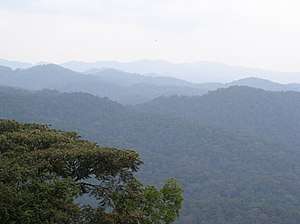
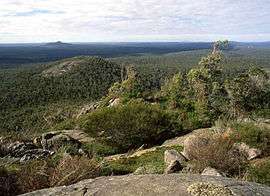
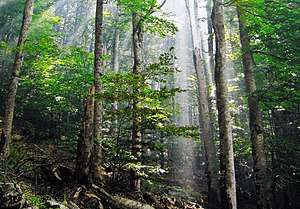
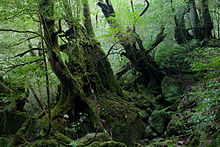

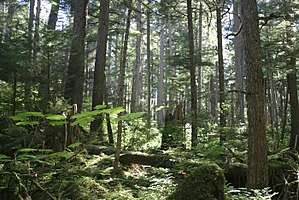
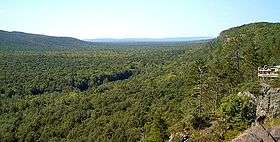
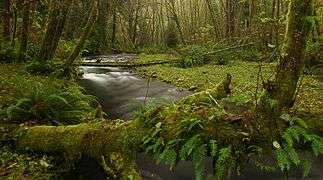
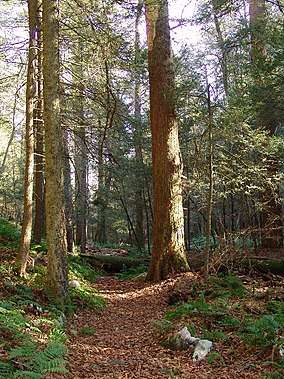
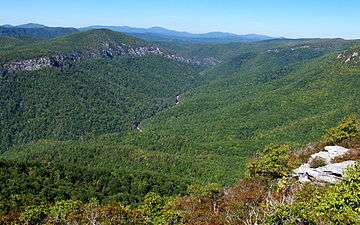
_on_Congaree_National_Park_Low_Boardwalk_trail.jpg)
